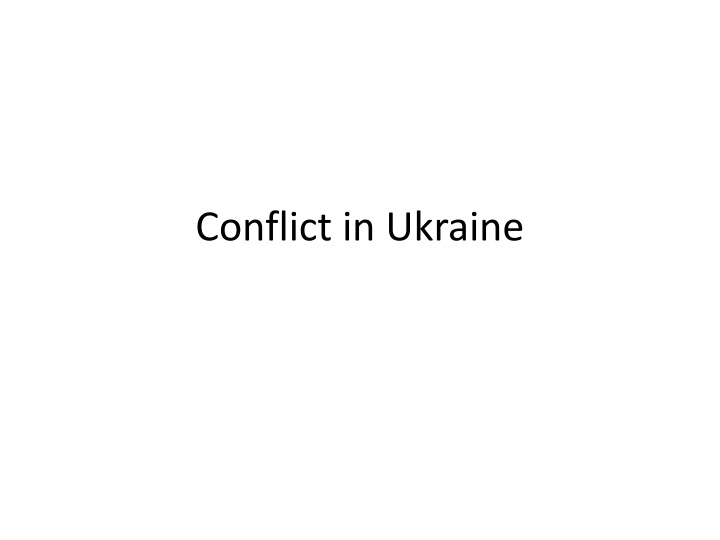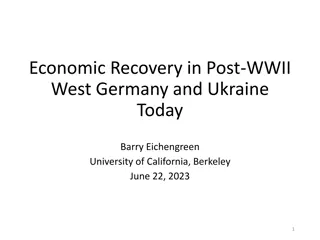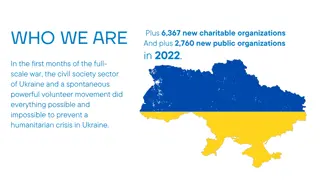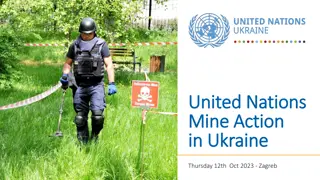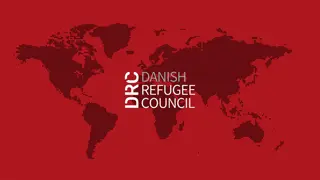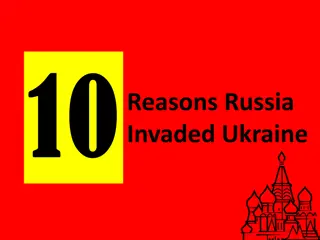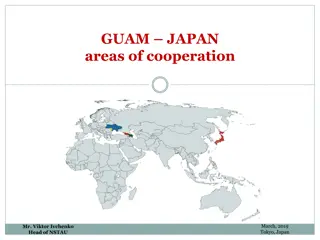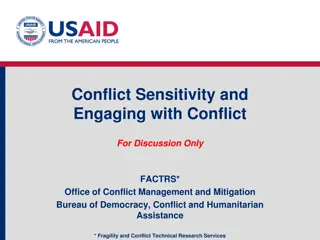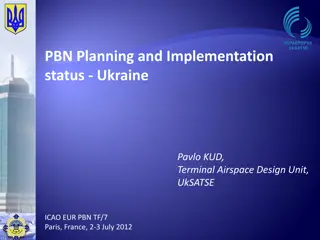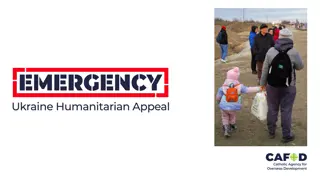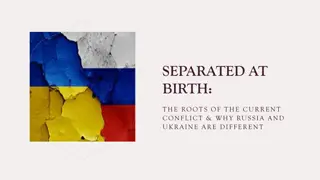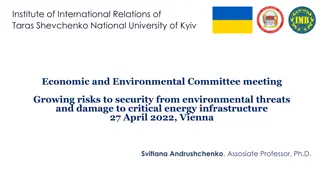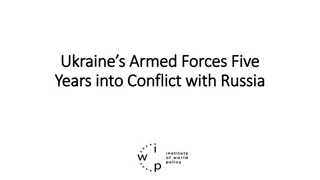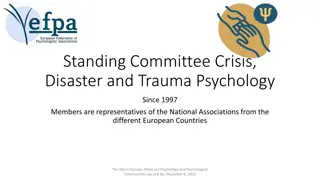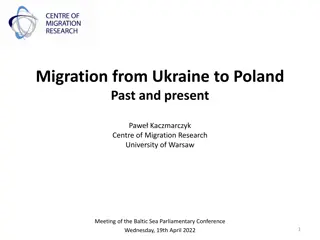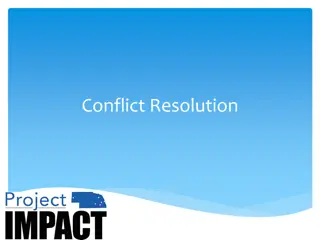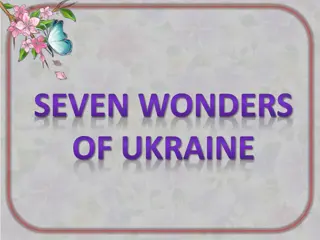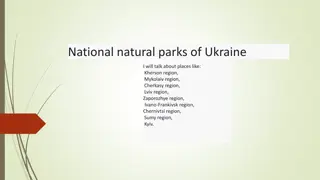History of Conflict and Independence in Ukraine
The history of Ukraine is marked by conflicts, independence struggles, and political upheavals. From the establishment of the Central Rada in 1917 to the Orange Revolution in 2004, the country has seen shifts in power, annexations, declarations of independence, and resistance to Soviet rule. The journey towards sovereignty and self-determination is characterized by moments of turmoil, resilience, and aspirations for democracy.
Download Presentation

Please find below an Image/Link to download the presentation.
The content on the website is provided AS IS for your information and personal use only. It may not be sold, licensed, or shared on other websites without obtaining consent from the author.If you encounter any issues during the download, it is possible that the publisher has removed the file from their server.
You are allowed to download the files provided on this website for personal or commercial use, subject to the condition that they are used lawfully. All files are the property of their respective owners.
The content on the website is provided AS IS for your information and personal use only. It may not be sold, licensed, or shared on other websites without obtaining consent from the author.
E N D
Presentation Transcript
1917 - Central Rada (Council) set up in Kiev following collapse of Russian Empire. 1918 - Ukraine declares independence: Ukrainian People's Republic set up. Numerous rival governments vie for control for some or all of Ukraine during ensuing civil war. 1921 - Ukrainian Soviet Socialist Republic established as Russian Red Army conquers two- thirds of Ukraine. Western third becomes part of independent Poland. 1932 - Approximately 7 million peasants perish in man-made famine during Stalin's collectivisation campaign.
1945 - Allied victory in World War II leads to conclusive Soviet annexation of western Ukrainian lands. 1954 - In a surprise move, Soviet leader Nikita Krushchev transfers the Crimean peninsula to Ukraine as a "gift". Armed resistance to Soviet rule ends with capture of last commander of Ukrainian Insurgent Army (UPA). 1960s - Increase in covert opposition to Soviet rule, leading to repression of dissidents in 1972.
Independence 1990 - Student protests and hunger strikes bring down government of Vitaliy Masol. 1991 - Ukraine declares independence following attempted coup in Moscow: 90% vote for independence in nationwide referendum in December. 1997 - Friendship treaty signed with Russia. Ukraine and Russia also reach agreement on the Black Sea fleet.
"Orange Revolution" 2004 November - Official count indicates presidential election victory for Prime Minister Viktor Yanukovych. Western and other independent observers report widespread vote rigging. Opposition candidate Viktor Yushchenko launches campaign of mass street protest and civil disobedience. Supreme Court later annuls result of poll. 2004 December - Opposition candidate Viktor Yushchenko tops poll in election re- run. Rival candidate Viktor Yanukovych challenges result but resigns as prime minister. 2005 January - Viktor Yushchenko sworn in as president after Supreme Court rejects challenge by losing candidate Mr Yanukovych.
"Orange Revolution" 2005 February - President's nominee Yulia Tymoshenko overwhelmingly approved as prime minister by parliament. 2005 March - President Yushchenko announces that suspected killers of journalist Georgiy Gongadze are in custody. He also accuses the former authorities of a cover-up. Former Interior Minister Kravchenko, who had been due to give evidence in Gongadze investigation, shot dead in apparent suicide.
Economic woes 2009 January - Russia stops all gas supplies to Ukraine after collapse of talks to end row over unpaid bills and prices, leading to shortages in southeast Europe. Supplies are restored a week later when Ukraine and Russia sign a 10-year deal on gas transit. 2009 July - Ukrainian security service says a key suspect in the murder of the opposition journalist Georgiy Gongadze in 2000 has been arrested and has confessed to the killing. 2009 December - Ukraine and Russia sign deal on oil transit for 2010, allaying fears of supply cuts to Europe.
Yanukovych comeback 2010 February - Viktor Yanukovych is declared winner of second round of presidential election. His main rival, Prime Minister Yulia Tymoshenko, refuses to accept the result, alleging fraud. 2010 March - Yulia Tymoshenko steps down from the premiership after a number of her supporters in parliament switch sides and she loses a no- confidence vote. President Yanukovych appoints his long-standing ally Mykola Azarov to succeed her. 2010 April -Parliament ratifies an agreement to extend Russia's lease on the Black Sea fleet base at Sevastopol in Crimea for 25 years, in return for cheaper gas imports. 2010 June - Parliament votes to abandon Nato membership aspirations. 2010 July - International media freedom watchdogs criticise a Kiev court's decision to cancel the allocation of broadcasting frequencies to two privately-run TV channels. 2010 October - Constitutional court overturns limits on presidential power introduced in 2004.
Yanukovych comeback 2010 December - Former Prime Minister Yulia Tymoshenko and Interior Minister Yuriy Lutsenko are charged with abuse of state funds. Both deny the charges and say they are politically motivated. 2011 October - A court jails former PM Tymoshenko after finding her guilty of abuse of power over a gas deal with Russia in 2009. EU warns Ukraine of "profound implications". 2011 May-June - Ukraine postpones summit of Central and East European leaders in Yalta after several leaders boycott it over the mistreatment of opposition leader Yulia Tymoshenko in prison. Others boycott the Euro 2012 football championship. 2012 July - The European Court of Human Rights condemns the detention of former interior minister Yuriy Lutsenko and demands his release and compensation. Police in Kiev fire tear gas to disperse hundreds of protesters angry at a law pushed through parliament with little debate that gives Russian regional language status. 2013 April - European Court of Human Rights rules unanimously that the arrest and detention of Yulia Tymoshenko in 2011 was unlawful.
New revolution 2013 July - Russia halts imports of chocolate from one of Ukraine's main confectionary makers, Roshen, saying its products fall below safety standards, in what is seen as retaliation for Ukraine's efforts to integrate further with the EU. 2013 November - Tens of thousands of protesters take to the streets of central Kiev and other cities to protest at the government's sudden decision to abandon plans to sign an association agreement with the EU. They accuse the government of bowing to Russian pressure, as well as being corrupt and unaccountable. 2013 December - Russia agrees to slash price of gas supplied to Ukraine and lend $15bn to mollify protesters. 2014 February - Security forces kill at least 77 protesters in Kiev. President Yanukovych flees to Russia, opposition takes control under interim president Olexander Turchynov and acting prime minister Arseny Yatseniuk. Russia refuses to recognise takeover.
Russia annexes Crimea 2014 March - Russian forces help separatists seize power in Crimea, which Russia then annexes, prompting the biggest East-West showdown since the Cold War. US and its European allies impose sanctions on Russia. 2014 April - Pro-Russian separatists in eastern city of Donestsk declare an ''independent republic''. Government launches ''anti-terrorist'' operation in the east. 2014 May - Voters call for independence in Donetsk and Luhansk in a poll rejected as illegitimate by Kiev.
Historical Russia Russia Today
Petro Poroshenko wins presidential election 2014 June - Poroshenko signs a delayed association accord with the EU - pulling the country decisively out of Moscow's sphere. 2014 July - US and EU tighten sanctions on Moscow over its alleged involvement in the uprising in Ukraine. A Malaysian airliner comes down in rebel-held territory, killing all 298 people on board. It is believed to have been shot down. The UN Security Council calls for a full inquiry.
